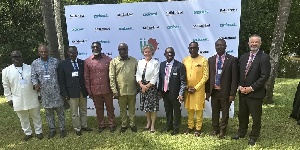- Home - News
- Elections 2024
- News Archive
- Crime & Punishment
- Politics
- Regional
- Editorial
- Health
- Ghanaians Abroad
- Tabloid
- Africa
- Religion
- Photo Archives
- Press Release
General News of Tuesday, 6 May 2025
Source: www.ghanawebbers.com
Ghana exploring ways to leverage climate finance to reduce emissions - Agric Minister
Ghana is exploring climate finance to reduce emissions and boost productivity. This effort aims to elevate incomes for smallholder farmers, vital to the agricultural economy.
Eric Opoku, the Minister of Food and Agriculture, emphasized the need for cooperation. He called for transparency and an inclusive approach that respects human rights.
Opoku spoke at the Africa Sustainable Commodities Initiative (ASCI) 9th Regional Meeting in Accra. The two-day event was co-hosted by Proforest and Solidaridad. It gathered ministers, officials, civil society actors, and private sector leaders from nine countries.
These countries represent 75% of Africa’s tropical forests and 25% globally. ASCI focuses on sustainable development of cocoa, rubber, palm oil, coffee, and other commodities. It aims to protect livelihoods while conserving natural resources.
The Minister praised ASCI and its partners for creating a collaborative platform. This platform allows public, private, and civil society actors to find environmentally sound solutions.
He noted that as ASCI expands its focus on multiple commodities, sustainable financing becomes urgent. The Ministry of Food and Agriculture is committed to building deforestation-free supply chains aligned with Ghana’s development goals.
This commitment is part of Ghana's Nationally Determined Contributions (NDCs). It also aligns with the Long-Term Low Emissions Development Strategy (LT-LEDS).
Opoku highlighted efforts to balance agricultural growth with forest protection. He mentioned bold steps taken in the tree crop sector through the Tree Crops Development Authority (TCDA).
The TCDA regulates priority crops like oil palm and rubber. It promotes best practices and sustainability standards while improving market access for smallholders.
“Let us use this opportunity to share knowledge,” he said. He urged participants to align actions for deeper commitments and greater grassroots impact.
Eric Amoako Agyare from Solidaridad West Africa discussed their work in West Africa’s oil palm sector since 2012. They aim to improve yields through Best Management Practices (BMP) at farms and mills.
Funding support comes from the Embassy of the Netherlands in Ghana. Since 2024, Solidaridad has implemented the NISCOPS programme with Dutch Ministry funding.
NISCOPS ensures sustainable management of oil palm landscapes while benefiting smallholder farmers in the supply chain. Over four years, it will strengthen partnerships with private sector actors for resilient landscapes.
Abraham Baffoe from Proforest noted policy changes driven by ASCI over ten years. These changes create an enabling environment for sustainable agricultural development.
The regional meeting aimed to share progress on enabling policies for responsible production. It also sought opportunities for effective implementation of national principles.
Baffoe stated that progress reflects a collective resolve for economic development alongside environmental sustainability. The initiative can facilitate producer-consumer partnerships needed for compliance with laws like the EU Deforestation Regulation (EUDR).











